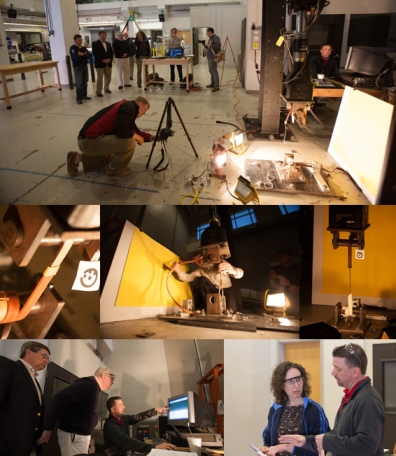Ogden News
WKU engineering facility testing reins for horse industry
- Thursday, May 16th, 2013
A testing session for horse safety reins is one example of the value of WKU’s Engineering-Manufacturing-Commercialization Center, EMCC manager Ron Rizzo says.
“The EMCC was created to provide services like this to the community and to industry,” Rizzo said. “Working on creation of the standard is a significant accomplishment for us to be a part of.”

WKU’s Engineering-Manufacturing-Commercialization Center sponsored a testing session for horse safety reins on May 13. Representatives of the Jockeys’ Guild, Jockey Club and National Horsemen’s Benevolent & Protective Association attended. Top: WKU engineering student Tim Bucklew checks the high-speed camera after a rein was broken. Middle: EMCC manager Ron Rizzo loads a rein onto the hydraulic lift, which tests for the force required to break it. Bottom: Civil engineering professor Matt Dettman explains the testing process and results to Terence Meyocks and Phil Hanrahan (left photo) and Cathy O’Meara (right photo). (WKU photos by Clinton Lewis)
The EMCC sponsored the rein testing session Monday (May 13) at WKU’s Engineering and Biological Sciences building.
Matt Dettman, the James D. Scott Professor in Civil Engineering, has been working on the horse rein project since 2006. His testing process has been used by the American Society of Testing and Materials (ASTM) in development of an industry standard.
“If the standard is accepted, in the future when you watch the Kentucky Derby, you’ll know all reins are ASTM-certified,” Dettman said.
The ASTM is scheduled to meet next week in Indianapolis where the standard will be reviewed. The testing session at WKU was a key step in the process as representatives of the Jockeys’ Guild, Jockey Club and National Horsemen’s Benevolent & Protective Association, Inc., viewed the process and collected information.
“We really appreciate WKU providing this service to the industry,” said Phil Hanrahan, chief executive officer of the National Horsemen’s Benevolent & Protective Association, Inc. “As important as horses are to Kentucky, it’s fabulous that WKU has stepped up and said we have the facilities to help out.”
The reins were attached to a hydraulic lift in the McConnell Integrated Applications Laboratory and tested for force needed to break them. Dettman collected data via a computer and engineering student Tim Bucklew used a high-speed camera to capture video of reins breaking.
Although reins don’t break too often, “one broken rein is one too many,” said Cathy O’Meara of The Jockey Club.
Jeff Johnston, regional manager for the Jockeys’ Guild, said the goal of an ASTM standard is to protect jockeys, horses and owners. “It’s really a win-win for everybody,” he said.
Hanrahan said horse owners are concerned about increased costs of safety reins, but noted that the testing session at WKU would help determine if the numbers used in the ASTM standards are correct or if they need adjusting.
“We can’t make everything perfectly safe. I understand the Jockeys’ Guild and Jockey Club’s concerns, but it just doesn’t happen that often. We’re concerned about jockey safety and horse safety too,” Hanrahan said. “We have to have good science numbers. We can’t be picking numbers out of the air.”
The representatives of all three groups said their collaboration on the project and the testing session at WKU was unique.
“We’ve all worked together to get to this point,” Hanrahan said. “This is a good example of our industry working together.”
The rein testing is part of a larger effort in the horse industry to improve safety in general, O’Meara said. “This is very important and this is why we’re here,” she said.
Contact: Matt Dettman, (270) 745-2462; or Ron Rizzo, (270) 745-8804.

